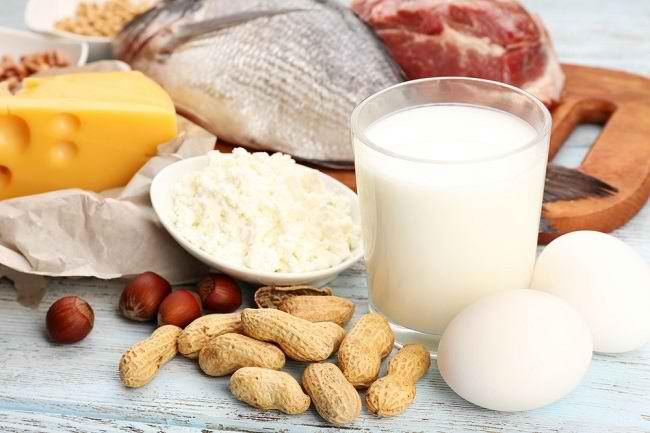High-protein foods are often chosen by those on a diet or aiming to build muscle mass. Additionally, these foods are important for pregnant and nursing mothers, as well as babies and toddlers, to support their growth and development.
During digestion, proteins are broken down into amino acids, which are essential for metabolism, cell and tissue repair, and the production of new cells.
There are various sources of protein you can consume, both from animals and plants. Here are some examples of high-protein foods:
- Lean Meat: Lean cuts of beef such as sirloin and round are low in fat but high in protein, iron, and B vitamins.
- Chicken: Chicken, especially without skin and fat, is rich in protein, selenium, choline, and B vitamins. It is also more affordable than beef.
- Fish and Seafood: Fish like salmon are rich in protein and omega-3 fatty acids. Other seafood such as shrimp, squid, and shellfish are also excellent sources of protein. However, choose fish that are free from mercury.
- Eggs: Eggs are well-known for their high protein content and are also rich in vitamins, minerals, and unsaturated fats, beneficial for weight management, healing, and heart health.
- Dairy Products: Milk, cheese, and yogurt are high in protein, calcium, and vitamin D. Opt for low-fat versions to maximize protein intake while dieting.
- Seeds: Seeds like chia seeds are a good source of plant-based protein and high in fiber, helping you feel full longer.
- Nuts: Almonds and peanuts are high in protein, fiber, magnesium, and vitamin E, which help maintain good cholesterol (HDL) and reduce bad cholesterol (LDL).
- Broccoli: Compared to other vegetables, broccoli is higher in plant-based protein and also contains fiber, potassium, vitamins C and K.
- Soybeans: Soybeans are considered a complete protein source as they contain all nine essential amino acids, making them a healthy snack option, such as edamame.
- Tofu and Tempeh: Made from soybeans, tofu and tempeh are rich in plant-based protein and isoflavones, antioxidants that fight free radicals.
- Mushrooms: Mushrooms are low in calories and high in protein and fiber, containing various antioxidants and essential minerals such as selenium, zinc, potassium, magnesium, and phosphorus. They support the immune system, cell growth, and heart health.
Guidelines for Meeting Protein Needs
Protein needs vary depending on weight, gender, age, physical activity, and health conditions. Generally, healthy adults under 65 years require about 0.8 grams of protein per kilogram of body weight daily. Children, athletes, and pregnant women need higher amounts to support growth and cell renewal.
High-Protein Diets
High-protein diets, such as the Dukan diet or blood type diet, often reduce carbohydrate intake. These diets can help with weight loss by keeping you full longer. However, they should be approached cautiously due to the risks of fiber deficiency, constipation, and heart disease from excessive red meat or high-fat dairy consumption. High-protein diets can also strain the kidneys, especially in individuals with kidney disorders, diabetes, or other chronic diseases.
Ensure your protein intake meets daily needs and balances with low-fat and low-calorie foods. Consult a doctor for personalized protein intake recommendations.

